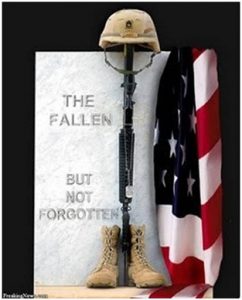Editor’s note: In honor of Memorial Day and the brave women and men who have sacrificed their lives for our country, we bring you today’s blog piece from a Women’s Foundation donor and supporter, Former Sergeant Stacy Kupcheni.
Memorial Day is a day to remember and honor military men and women who died in the service of their country, primarily in battle or as a result of wounds sustained in battle. Although female service members are included in the definition, they are often forgotten. Since the attacks on the World Trade Center on September 11, 2001, approximately 280,000 women have been deployed to Afghanistan and Iraq and as of early 2013 more than 150 women have been killed in these wars, according to the military. This is more than the number of U.S. military women killed in action in Korea, Vietnam, and Desert Storm combined.
 Recognition of these fallen women on Memorial Day is somewhat of an afterthought, and is a bit ironic, considering women were almost entirely responsible for the recognition of Memorial Day. Just weeks after the Civil War ended, Ellen Call Long organized a women’s memorial society to reconcile embittered enemies. Usually named some variant of “women’s relief society,” groups sprang up in both the North and South that not only memorialized the dead, but also cared for the war’s disabled and its widows and orphans. The efforts of these women led the way in turning the horrors of war into something that encouraged serenity and reflection. Unfortunately, many people don’t know the significance that women have played in the origins of this holiday, but even more upsetting, is that all too often, we forget to spend the time reflecting on the meaning of the day itself.
Recognition of these fallen women on Memorial Day is somewhat of an afterthought, and is a bit ironic, considering women were almost entirely responsible for the recognition of Memorial Day. Just weeks after the Civil War ended, Ellen Call Long organized a women’s memorial society to reconcile embittered enemies. Usually named some variant of “women’s relief society,” groups sprang up in both the North and South that not only memorialized the dead, but also cared for the war’s disabled and its widows and orphans. The efforts of these women led the way in turning the horrors of war into something that encouraged serenity and reflection. Unfortunately, many people don’t know the significance that women have played in the origins of this holiday, but even more upsetting, is that all too often, we forget to spend the time reflecting on the meaning of the day itself.
Before joining the Army, I was like many other Americans who just thought of Memorial Day as another day off of school/work, another day for sales events, and the start of summer BBQs. People saying “Happy Memorial Day” didn’t bother me then, and honestly, the day had no true meaning to me. On some level, I knew it was a day for remembering and honoring those who paid the ultimate sacrifice for their country, but I did not fully comprehend the scope of it.
After nearly 10 years of service in the military, and another 10 years of civilian service in the Department of Defense, 4 deployments to Iraq, and 1 deployment to Afghanistan, Memorial Day has taken on a new meaning.
To me, it is not only to remember and honor those who died in the service of their country, but also to honor those who returned home, like me, feeling like a shell of the person they once were.
No one who goes to war ever fully comes home – at least not in the emotional and psychological sense. Post-Traumatic Stress Disorder (PTSD) is a very real battle wound that affects everyone differently. Some make it back mostly the person they were before, but many return only physically, forever unrecognizable psychologically. These invisible wounds of war can be even more devastating than the battle scars that can be seen, but even harder to find support around. This is a sad state of reality, and while strides have been made to provide mental health services to returning veterans, more must be done.
For many people, the military is a place that means opportunity for higher education and career advancement that they would not otherwise have access to – for me, it made the difference between going to college or not. Yet, in many cases, the potential for economic security as a result from these opportunities is quickly negated by the impact of the psychological trauma caused by PTSD. At best, PTSD can make it difficult to perform well at work. But for many, the implications are farther reaching, resulting in an inability to keep a job, substance abuse, and other destructive behavior as coping mechanism. For some, the trauma is just impossible to bear.
According to a 2012 Veterans Affairs study, 22 veterans commit suicide every day. Among active duty troops, 2012 was the worst year for military suicides – making troop suicide more lethal than combat, although this data has only been tracked since 2008. As women, we are often expected to return to the roles that we led as spouses/partners, mothers, and caregivers while bearing these additional burdens of war.
This isn’t the kind of thing that most people want to talk about. It’s heavy and it is hard. But those are exactly the reasons why it is so important to talk about. As a veteran, my desire is that every veteran returning from combat has access to the supportive services they need to try to return to their life at home as whole as they can be.
As a woman, I hope that these services reflect the full reality of our lives as spouses, mothers, sisters, etc., and that they also recognize the often tenuous line that returning veterans walk between economic security and insecurity when battling PTSD, especially women who are already at an economic disadvantage to our male counterparts in our society.
I hope that those who lose their battle with PSTD or “Shell Shock” after returning home are also recognized and honored with appreciation and reverence on Memorial Day because these too, were wounds sustained in battle.
But for today, this Memorial Day, I hope you will honor those among you who risk it all to serve their country by taking part in the National Moment of Remembrance at 3pm (local time). Take the time to pause for one minute in an act of national unity, amongst the cook-outs and sales, to honor America’s fallen service members, their families, and the women long ago who made it a priority to recognize them.


